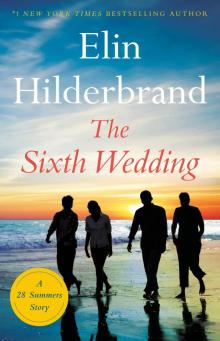- Home
- Elin Hilderbrand
Summer of '79: A Summer of '69 Story Page 2
Summer of '79: A Summer of '69 Story Read online
Page 2
Being a divorcée at Radcliffe is no big deal. Cambridge is filled with “Free to Be…You and Me” families—divorced mothers and fathers, unmarried couples with children, gay and lesbian couples, biracial couples, married couples with adopted children. Blair’s best friend from her Wellesley days, Sallie, has given up on ever finding a suitable man and is now a “single mother by choice.” She used a sperm donor—a six-foot-two engineer with dark hair and dark eyes—and she now has a four-year-old son, Michael.
Chestnut Hill, the affluent Boston suburb where Blair lives, is another story, however, as is the community at the children’s school. Everyone is married, everyone drives a woody wagon with the back seat and the backety-back crowded with kids and at least one dog, a golden retriever or Irish setter. Blair has a circle of lovely, well-meaning friends who were thrilled when Blair and the kids moved back. But once Blair admitted that Angus wouldn’t follow in six months or a year—he was staying in Houston permanently, they were getting a divorce—she sensed everyone pulling back a few inches so they could better judge her. They were “sad” for her, they said, even though she herself was much happier. The truth, Blair knows, is that her so-called friends see divorce as a virus, and if they get too close, they might catch it.
Tom Murray from three houses down offered to mow Blair’s lawn, which was very kind, but Blair felt she had to say no. The last thing she wanted everyone to see was another person’s husband mowing her lawn or shoveling her snow.
She hired a caretaker, a twenty-four-year-old Puerto Rican named Jefe. He was handsome and friendly and the kids loved him, especially George, once Jefe admitted that he had been a baseball star back in Ponce. Blair had once looked out the window to see George and Jefe playing catch in the front yard and, in a moment she regretted perhaps more than any other in her life, she told Jefe that she wasn’t paying him to play games and that he should leave immediately. Jefe had been hurt, George had stormed off in a sullen rage, and Blair ran up to her bedroom to cry. She knew that George needed a man around but she couldn’t bear to have the neighborhood whispering about exactly what role Jefe the caretaker was filling over at the Whalen house.
Being divorced is a social stigma; there’s no denying it. Blair thinks about dating again, but how to go about it? Back in April, she let Sallie talk her into an outing with Parents Without Partners, which Sallie called “PWP.” Blair and the twins and Sallie and little Michael had joined the other single mothers and fathers and their children at Fenway Park to see the Red Sox play the Philadelphia Phillies. It was meant to be fun, Blair knew, like a grown-up version of a mixer in college. The weather cooperated: it was sunny and warm enough to sit in the bleachers without a jacket or sweater. But Blair found herself preoccupied with what was wrong rather than what was right. On the one hand, Sallie chose well. Because it was a baseball game, most of the other participating parents were men. However, Blair couldn’t find a single candidate she would consider dating. Some men were fat and sloppy, some had stringy combovers, some had facial hair that reminded Blair of Charles Manson. But it wasn’t only appearances that put Blair off—after all, Angus had looked like a central-casting poindexter. The problem was that the PWP fathers carried the stench of desperation. Most of them slouched, and those who did stand up straight seemed angry at the world.
The gentleman closest to Blair—he introduced himself as Al Sparks and looked straight at her chest—wasn’t bad-looking, but he jumped out of his seat after nearly every pitch and cursed at the umpires. He swore in front of his two sons, though they didn’t notice because they were too busy tussling over the bucket of popcorn he’d bought for them to share, until the older son pulled a little too hard and the bucket upended all over the seat in front of them, which was occupied by a toddler who had fallen asleep with his head cocked at an unnatural angle while his oblivious father kept track of the stats in a spiral-bound notebook.
The children at this outing seemed like ragamuffins. Blair didn’t like to be ungenerous but she couldn’t help noticing a little girl with tangled hair and a boy, nearly obese, whose father had stuffed him like a sausage into a Yastrzemski jersey. The children looked…motherless, and this made Blair suspect that, while she was here looking for someone who would trim the hedges and take the car for an oil change, the gentlemen were looking for a woman who knew how to French braid and who might be willing to cook a hot breakfast every morning.
If Blair were to date, or God forbid, marry, one of the men in PWP, she would become…a stepmother. This wasn’t something she had considered.
Of course Blair had been raised by a stepfather—David Levin, who had been perfect in nearly every way. But that felt different somehow. Kate had been tragically widowed; David had swooped in to save the day. It hadn’t been two broken families awkwardly trying to fit themselves together.
Blair is too much of a feminist to admit that she’s now looking for a David—a single man without children who will love Blair, George, and Gennie unconditionally—but secretly, she fears she is.
The Red Sox game was Blair’s one and only foray with PWP. Sallie, meanwhile, dated angry Al Sparks for six weeks before declaring him an “absolute psychopath,” when he got drunk at a Memorial Day picnic and lost his temper over a frisbee that landed on the grill.
Blair is irritated with her mother’s comments about the propriety of her taking the children to the Sweet Shoppe, although as she parks the car on Main Street in front of Bosun’s Locker, she does in fact worry that she will bump into someone she knows who will want to express his or her condolences about Exalta—and how will Blair explain that they’re on their way out for sundaes?
“Let’s hurry along,” Blair says. The twins are in the back seat, completely oblivious to their surroundings, despite the rumbling of the Scout over the cobblestones. Gennie is immersed in her book of science experiments and George is doing the crossword puzzle from the Boston Herald.
They are, Blair thinks somewhat mournfully, Angus’s children—obsessed with the world of the mind.
But then she brightens, because at least the twins look like Blair. They’re both blond, pink-cheeked, nicely proportioned, and they have straight white teeth. Gennie is an inch or two taller than George, but that will soon change. Next month, they’ll be ten. How did that happen?
“You know,” Blair says, “I went into labor with the two of you on this very street.”
“We know,” they say in unison.
Of course they know, it’s part of Foley-Levin-Whalen family lore. In the summer of 1969, while Angus was in Houston working on the Apollo 11 mission to the moon, Blair went into labor right in the middle of Buttner’s department store. She had taken Jessie in to be fitted for her first bra when her water broke. Blair had waddled up Main Street, leaking amniotic fluid all over the brick sidewalk, while Jessie ran ahead to get Kate, who appeared moments later in the Scout. Because Blair couldn’t possibly endure a trip over the cobblestones, Kate had driven down one-way Fair Street in reverse. The twins had been born the next morning, a scant hour before the moon launch.
Blair climbs out of the car and has to snap her fingers through the open back window to get the twins to move.
“Let’s go,” she says. “Hot fudge.”
“Blair?” a voice says. “Blair Foley?”
Blair has been inside the Sweet Shoppe for ten seconds, just long enough to shepherd the twins to the end of the line. The Sweet Shoppe never changes. It’s still deliciously cool and smells like vanilla waffle cones.
Blair turns. A man is standing at the cash register holding a double scoop of rocky road in a sugar cone. He accepts a quarter in change, grabs a napkin from the dispenser, and heads right for Blair with a sly smile on his face.
Blair tries to prepare herself. Who is this? The man is her age. He’s wearing a powder blue leisure suit and blue gradient-lens glasses; his reddish hair is long and feathered. Surely this isn’t someone she knows?
“It’s Larry,” he says. “Larry Winte
r.”
Larry Winter! Blair dated Larry Winter for three consecutive summers when she was a teenager. In those days, Blair, Kirby, and Tiger lived in the guest cottage of Exalta’s house, called Little Fair. Larry Winter would ride over from Walsh Street on his Schwinn, throw a pebble at Blair’s bedroom window, and the two of them would neck—Larry perched on the top rail of the fence, Blair tucked between his legs. To this day, it was some of the loveliest kissing Blair can remember, and some of the purest desire. They had been caught once by Mr. Crimmins, the caretaker, who had passed down the side street, Plumb Lane, late at night on his way home from somewhere, probably Bosun’s Locker. He’d stepped out of the darkness, startling them both, and said, “Time to call it a night, kids.” Then he carried on his way in the direction of Pine Street, where he lived in an efficiency. Blair remembers wanting to chase after him to beg him not to tell her mother or—horrors!—her grandmother. But Blair needn’t have worried; Mr. Crimmins kept her secret.
“Larry!” Blair says. “What a surprise! I thought you were a Floridian these days.”
She hopes she has this right. Larry Winter went to Georgetown to study political science but somehow he’d ended up as the food and beverage manager at a private club in Vero Beach. He’d risen to general manager and then had started a venture of his own somewhere else in Florida. The Everglades, maybe?
“I’m up for a couple of weeks,” Larry says. “The heat in Florida this time of year, even in the Keys…”
Key Largo, Blair thinks with a mental snap of the fingers. He owns a nightclub in Key Largo.
“…plus, Grandma isn’t getting any younger…” Larry stops himself. “Which reminds me. I heard about Exalta passing. I’m so sorry.”
Blair feels tears burn her eyes. The Sweet Shoppe is only a few blocks away from Exalta’s house on Fair Street and it’s inconceivable that, should Blair and the twins venture up there after their sundaes, the only person they would find would be Mr. Crimmins, who had become Exalta’s devoted companion.
Unlike Blair, Exalta hadn’t given one whit what people thought about her shacking up with the caretaker. She and Bill Crimmins had fallen in love. For the past ten years, Exalta had been a different woman. Gone was the stern, judgmental blue blood and in her place they’d enjoyed a fun-loving old lady who listened and laughed.
When Blair last visited Exalta, she had meant to tell her grandmother that she and Angus had divorced. But Exalta was so sick and frail at that time, swimming in and out of lucidity, that Blair couldn’t bear to deliver the news. Exalta had adored Angus. Why burden her with news that would only make her sad and disappointed?
At that point, Exalta had still been living in her house in Boston, on Mount Vernon Street in Beacon Hill, but a few days after Blair’s visit, Exalta sat bolt upright in bed and clearly announced that she wanted to spend her final days in the house on Nantucket. And so Bill Crimmins arranged for a door-to-door ambulance transfer—the ambulance even went over on the ferry—and they installed Exalta comfortably in the house on Fair Street, where she died two days ago none the wiser about Blair and Angus.
Blair leaves the twins in line and steps away a bit so she can talk to Larry more privately. “As I’m sure you’ve heard,” she says, “I got divorced.”
Larry turns his head so he’s looking at her with only one eye; this, she recalls, is a gesture of his. “I had not heard that, actually.”
Ah, right. Larry lives in Florida. The only person who would have told him is his grandmother, Mrs. Winter, and she would only have heard from Exalta. Even so, Blair is glad she came out with it before Larry had a chance to ask about Angus.
Blair shrugs. “Didn’t work out, but the kids and I are fine. We live outside of Boston. Everyone’s happy.” She flashes Larry a smile that she hopes indicates “happy,” or appropriately happy, considering they’re on island to attend a funeral. “How about you? Married? Kids?”
Larry stares at the ice cream cone that is slowly melting in his hand. “Not married, no kids,” he says. “Haven’t met the right woman.”
Blair feels herself flush. “Oh. Well, I’m sure it’s only a matter of time.”
Larry stares at his cone for a second; he must be finding this run-in as surreal as she is. “So, listen, I’m planning on coming to the funeral and the reception. Escorting my grandmother.”
“Of course,” Blair says. “You belong there. And Kirby has planned a bonfire tomorrow night at Ram Pasture. Young people only.”
Larry laughs. “That leaves me out.”
“And me,” Blair says. “I’m thirty-four. Twice as old as the summer we last dated.”
“I’ve got you by a year, don’t forget. And you, Blair Foley, are far more gorgeous now than you were at seventeen.”
Flush turns to blush. He’s lying, though Blair has lost a lot of weight since the divorce and now might be nearly as slender as she was in high school. “Thank you, Larry. I needed to hear that.”
“I’ll see you tomorrow,” Larry says. “Enjoy your ice cream.”
Blair is as preoccupied as the twins as they sit and eat their sundaes. Blair made George and Gennie leave their projects in the car and so they’ve moved on to their second favorite pastime—dissecting a special trilogy episode of The Brady Bunch. The Bradys go to Hawaii, they find a tiki that appears to be cursed—Greg Brady has a surfing accident, a tarantula crawls on one of the other brothers—and then Blair loses the plot when they start talking about a cave and someone (or something?) named Oliver. Doesn’t matter. Blair is doing her own dissecting. Larry Winter, of all people! Single and without children, telling Blair she looked “more gorgeous” than she had at seventeen. And she’ll see him tomorrow—at the funeral, the reception, and the bonfire.
“Time to go,” Blair says, though she has barely touched her sundae at all.
Blair drives back to her mother and David’s sprawling beachfront compound on Red Barn Road, listing Larry Winter’s pros and cons. The only con she can come up with is that he lives in Florida and owns a nightclub, which might explain why he looks like one of the Bee Gees. Well, another con is that Blair felt no particular emotion when she saw him, other than a fondness when remembering the kissing. And she’d liked being complimented, of course, because who didn’t? But there was definitely something missing—a zing, a ping, a tingle. They had broken up so long ago, Blair remembers, because she had grown tired of him.
The pros are that he’s single and without children. But surely she’s entitled to ask for more than just that?
Blair wonders if the divorce has turned her heart to ice. Look at how she spoke to poor Jefe. Maybe she’ll feel differently about Larry tomorrow night at the bonfire, once she’s had a few drinks. Maybe her run-in with Larry was meant to be, orchestrated by Exalta, who is watching out for Blair from above.
The driveway of Kate and David’s compound is crowded with cars. Blair sees the Trans Am that Tiger drives; he’ll have to give that thing up once he and Magee finally have children. She sees Kirby’s LTD and Mr. Crimmins’s pickup truck. And she sees a turquoise Porsche 911 with the top down.
Blair freezes. Only one person she knows would drive a car like that.
“Looks like we have company,” Blair says.
Kate and David bought the sprawling old house on Red Barn Road ten years earlier, right after the twins were born, back when Tiger was still over in Vietnam. They lived in it for five years without making a single change. Then, once Jessie left for Mount Holyoke and Kate no longer had children at home, she and David sold the big house in Brookline, rented an apartment in Charles River Park, and poured their time, energy, and resources into the Nantucket property. The main house got a complete facelift—a new roof; new doors and windows; new wood floors throughout, except for the family room, which they carpeted; paint for all the bedrooms; an updated kitchen with avocado green appliances and bright pink and orange wallpaper so that when you were at the counter making a sandwich, you felt like you were standing in the m
iddle of fruit ambrosia. (Only Exalta was brave enough to say to Kate, “You might have chosen something more classic, darling.”) But Kate wanted a happy, modern house as a counterpoint to the staid, history-laden confines of All’s Fair. She and David built a guest cottage on the back edge of the property—two bedrooms, one bath. (This was where Blair and Angus had always stayed with the children, now just Blair and the children.) Between the guest cottage and the main house, they built a clay tennis court and a turquoise lozenge of an in-ground pool that had a curved fiberglass slide at one end. There was a concrete patio for barbecuing and even a portable tiki bar that David hauled out of the shed every Memorial Day for the summer. Kate had newly discovered frozen blender drinks—strawberry daiquiris and margaritas—which she served in obscenely large glasses that she got on sale at Kmart.
If the whole thing sounded out of character for Kate, well, it was a bit—but Kate made no secret that she wanted the compound filled with grandchildren someday.
On that front, Blair had done her part. The onus now fell to her other three siblings.
Kirby, Tiger, and Jessie are all out on the back patio, sitting under the awning by the pool. Mr. Crimmins and Kate and David are there as well, and Magee, Tiger’s wife, who quit her dental hygienist’s job to care for Exalta when she first fell sick. (Kate had been relieved, Blair knows. She was certain the reason Tiger and Magee didn’t have children was because Magee worked too hard.)

 What Happens in Paradise
What Happens in Paradise Reunion Beach
Reunion Beach The Sixth Wedding
The Sixth Wedding 28 Summers
28 Summers Summer of '79: A Summer of '69 Story
Summer of '79: A Summer of '69 Story Troubles in Paradise
Troubles in Paradise The Perfect Couple
The Perfect Couple Winter Solstice
Winter Solstice Barefoot: A Novel
Barefoot: A Novel